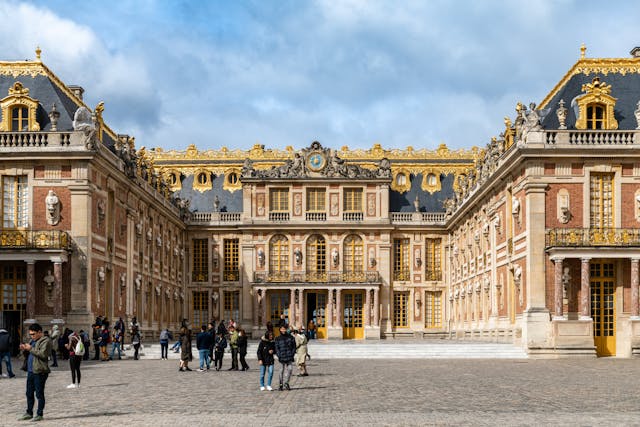
Did the Treaty of Versailles cause World War 2? The Treaty of Versailles didn’t directly cause World War 2, but it did put in place some of the contributing factors.
The Treaty of Versailles was signed on June 28th, 1919. It was the peace treaty that brought World War 1 to an official end. The fighting itself had ended just over half a year earlier when German had signed the armistice on 11 November 1918. That armistice had been signed in a railway carriage that was hidden in the Compiegne Forest. The idea was to keep the proceedings a secret, but that technically ended the fighting.
The peace treaty was signed in the Hall of Mirrors in the Palace of Versailles. The location was specifically chosen to hammer home to Germany where they had lost the war and as a form of revenge for France. This was because France had been defeated in the Franco-Prussian War in 1870 and the new German Empire had captured all of the area around Versailles. Kaiser Wilhelm II had proclaimed the start of the German Empire and been crowned in the Hall of Mirrors in the Palace of Versailles. The Franco-Prussian war was in itself fought as revenge for France’s actions under the various Napoleons and its position as the dominant country in Europe. The chance to force Germany to sign the treaty in the same place they declared the start of their empire was too good to be true. Then, Germany got their revenge in World War 2 by making France sign their surrender in the same railway carriage that Germany had been forced to surrender in back in 1918. This could have carried on, but the cycle was ended when Germany surrendered at the end of World War 2.
So, did the Treaty of Versailles cause the Second World War? It didn’t make it definite, of course, but it did create many of the grounds that made another war likely. The main problem was that World War 1 had been a war beyond anyone’s experience and expectations. So many had been killed and so much destroyed. However, unlike World War 2, all of the destruction, and most of the death, was in Europe. The USA only joined the war later on and they only lost 320,000 soldiers. That is still an enormous number, but it is much lower than the deaths in Russia and Europe. Germany lost 2 million, Russia lost 1.7 million, France lost 1.15 million, and the UK lost 900,000. France had also lost 400,000 civilians and been heavily damaged. They had lost a lot of territory and the French aims were to make Germany into a country that could never fight like that again. Very much revenge. Britain had lost large numbers of people, but had not been damaged because the fighting was on the European mainland. They wanted to punish Germany, but not as much as France did. Although, Britain saw it as a chance to get some of Germany’s colonies. The US was much more in favor of rebuilding.
The Treaty of Versailles gave full responsibility for World War 1 to Germany. It limited the German army to 100,000 men. Germany lost all of its weapons and ships, and forbidden from building more. Germany lost 13% of its territory. Wilhelm II was tried for war crimes, although he wasn’t punished and spent the rest of his life in the Netherlands. And Germany was forced to pay reparations of 132 billion gold marks, which is about $605 in 2025. This was a sum that needed to be paid, even though Germany had lost 4% of their male population.
This treaty brought about several problems. The first, and one that Hitler would use, was the idea of war guilt. Germany had been solely blamed, but the war had started because of Austria-Hungary, and they hadn’t been blamed. The Germans had only declared war when the Russians mobilized. To people living in Germany after the war, they were being blamed for something they hadn’t started. The treaty also broke up many larger countries that had belonged to the Austro-Hungarian Empire into smaller countries. This made the balance of power across Europe a lot less stable and was something Hitler was able to take advantage of. And the financial burden was huge. Paying the reparations crippled Germany’s economy and they had runaway inflation, reaching 30,000% in October 1923. $1 was worth 4.2 trillion marks. This ended up impacting the whole of the world’s economy and some people have suggested it may even have started the Great Depression of 1929. In Germany, this created a lot of instability and anger among people who had no jobs.
All of these things made an environment where someone like Adolf Hitler could rise up and take control, but they didn’t make war inevitable. If someone else had risen up and taken control, the path of the world could have been very different. There were so many things that contributed to World War 2 starting that it is impossible to blame the Treaty of Versailles, but had the treaty that ended World War 1 been more forgiving and helped rebuild Germany, who knows what would have happened? And this is what I learned today.
Try these next:
Sources
https://www.history.com/news/treaty-of-versailles-world-war-ii-german-guilt-effects
https://www.nationalgeographic.com/culture/article/treaty-versailles-ended-wwi-started-wwii
https://en.wikipedia.org/wiki/Treaty_of_Versailles
https://www.bbc.co.uk/bitesize/articles/zxjg3j6#zc36m39
https://en.chateauversailles.fr/discover/history/key-dates/proclamation-german-empire-1871
https://en.wikipedia.org/wiki/World_War_I_casualties
Photo by Kirandeep Singh Walia: https://www.pexels.com/photo/view-of-people-walking-in-front-of-the-palace-of-versailles-17283209/
